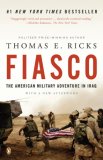Summary | Excerpt | Reviews | Beyond the Book | Readalikes | Genres & Themes | Author Bio

The American Military Adventure in Iraq
by Thomas E. Ricks1. A BAD ENDING
SPRING 1991
President George W. Bush’s decision to invade Iraq in 2003 ultimately may
come to be seen as one of the most profligate actions in the history of American
foreign policy. The consequences of his choice won’t be clear for decades, but
it already is abundantly apparent in mid-2006 that the U.S. government went to
war in Iraq with scant solid international support and on the basis of incorrect
information—about weapons of mass destruction and a supposed nexus between
Saddam Hussein and al Qaeda’s terrorism—and then occupied the country
negligently. Thousands of U.S. troops and an untold number of Iraqis have
died. Hundreds of billions of dollars have been spent, many of them squandered.
Democracy may yet come to Iraq and the region, but so too may civil war or a regional
conflagration, which in turn could lead to spiraling oil prices and a global
economic shock.
This book’s subtitle terms the U.S. effort in Iraq an adventure in the critical
sense of adventurism—that is, with the view that the U.S.-led invasion was
launched recklessly, with a flawed plan for war and a worse approach to occupation.
Spooked by its own false conclusions about the threat, the Bush administration
hurried its diplomacy, short-circuited its war planning, and assembled an
agonizingly incompetent occupation. None of this was inevitable. It was made
possible only through the intellectual acrobatics of simultaneously “worst-casing”
the threat presented by Iraq while “best-casing” the subsequent cost and difficulty
of occupying the country.
How the U.S. government could launch a preemptive war based on false
premises is the subject of the first, relatively short part of this book. Blame must
lie foremost with President Bush himself, but his incompetence and arrogance
are only part of the story. It takes more than one person to make a mess as big as
Iraq. That is, Bush could only take such a careless action because of a series of systemic
failures in the American system. Major lapses occurred within the national
security bureaucracy, from a weak National Security Council (NSC) to an overweening
Pentagon and a confused intelligence apparatus. Larger failures of oversight
also occurred in the political system, most notably in Congress, and in the
inability of the media to find and present alternate sources of information about
Iraq and the threat it did or didn’t present to the United States. It is a tragedy in
which every major player contributed to the errors, but in which the heroes tend
to be anonymous and relatively powerless—the front-line American soldier doing
his best in a difficult situation, the Iraqi civilian trying to care for a family
amid chaos and violence. They are the people who pay every day with blood and
tears for the failures of high officials and powerful institutions.
The run-up to the war is particularly significant because it also laid the shaky
foundation for the derelict occupation that followed, and that constitutes the major
subject of this book.While the Bush administration—and especially Donald
Rumsfeld, Paul Wolfowitz, and L. Paul Bremer III—bear much of the responsibility
for the mishandling of the occupation in 2003 and early 2004, blame also must
rest with the leadership of the U.S. military, who didn’t prepare the U.S.Army for
the challenge it faced, and then wasted a year by using counterproductive tactics
that were employed in unprofessional ignorance of the basic tenets of counterinsurgency
warfare.
The undefeated Saddam Hussein of 1991
The 2003 U.S. invasion and occupation of Iraq can’t be viewed in isolation.
The chain of events began more than a decade earlier with the botched close of
the 1991 Gulf War and then it continued in the U.S. effort to contain Saddam
Hussein in the years that followed. “I don’t think you can understand how OIF”—
the abbreviation for Operation Iraqi Freedom, the U.S. military’s term for the
2003 invasion and occupation of Iraq—“without understanding the end of the
’91 war, especially the distrust of Americans” that resulted, said Army Reserve
Maj.Michael Eisenstadt, an intelligence officer who in civilian life is an expert on
Middle Eastern security issues.
Excerpted from Fiasco: The American Military Adventure in Iraq, (c) 2006 by Thomas E. Ricks. Reproduced with permission of the publisher, Penguin Press. All rights reserved.






Your guide toexceptional books
BookBrowse seeks out and recommends the best in contemporary fiction and nonfiction—books that not only engage and entertain but also deepen our understanding of ourselves and the world around us.